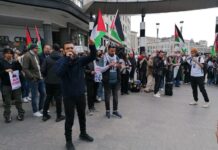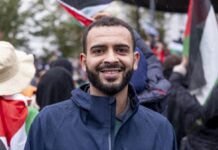
The following is an updated version of the article originally published on 17 June 2017 by Samidoun Palestinian Prisoner Solidarity Network. The living legacy of Fouad Hijazi, Atta al-Zeer, Mohammed Jamjoum and the Buraq Revolution is deeply relevant today, especially as the Zionist regime seeks to target Palestinian prisoners for execution in an official manner, even as the policy of slow death, targeted assassination and murderous raids on the Palestinian resistance continues.
This anniversary also comes as Zionist forces continue to engage in “flag marches” designed to declare full colonial control over all of Palestinian Ara Jerusalem; it was a very similar march that sparked the uprising of 1929. The close ties between Zionism and British colonialism – which would eventually imprison 900 Palestinians and execute 20 for participating in the revolt – today mirrors the strategic partnership between the Zionist state and U.S. and other Western imperialist powers. Over 93 years later, the Palestinian revolution continues, until liberation and return.
17 June marks the anniversary of the execution of three of the earliest martyrs of the Palestinian prisoners’ movement – Fouad Hijazi, Atta al-Zeer and Mohammed Khalil Jamjoum – by British colonial occupiers, in Akka prison. Today, on 17 June 2023, we salute these martyrs and pledge to struggle for the freedom of all prisoners of Zionism and imperialism.
The execution of these Palestinian strugglers has remained for years an ongoing story of resistance that continues to inspire strugglers through over 100 years of resistance to colonization and occupation. Indeed, the song written to commemorate Hijazi, al-Zeer and Jamjoum, “From Akka Prison,” today remains one of the most well-known and powerful poems of the Palestinian prisoners’ movement.
Hijazi, al-Zeer and Jamjoum were seized by the British colonizers for their role in Al-Buraq Revolution of 1929, named for the al-Buraq Wall in Jerusalem. The uprising was sparked by Zionist groups coming to the wall to plant Zionist flags, declaring that “This wall is ours.”
In Jerusalem, Haifa, Yafa and Safad, Palestinians rose up against British colonization and the declared Zionist plans to colonize Palestine and declare it a “Jewish state,” with the support of Britain as expressed in the notorious Balfour Declaration. Hundreds of Palestinians were seized by British forces and 26 sentenced to death by hanging; there was such an outcry by the Palestinian people that most of these sentences were converted to life imprisonment, with the exception of Hijazi, Jamjoum and al-Zeer.

Fouad Hijazi was 26 years old, from Safad; Mohammed Jamjoum was 28, from al-Khalil, as was Atta al-Zeer, 35.
Born in Safad in 1904, Fouad Hijazi received his primary education in his hometown; his university education was completed at the American University of Beirut. He actively participated in the Buraq Revolution. and wrote a message to his family the day before his execution, which was published in the newspaper on 18 June 1930. In the message, he said, “On 17 June of each year, this should be a historic day in which speeches are made and songs are sung in the memory of our blood spilled for the sake of Palestine and the Arab cause.”
Mohammed Khalil Jamjoum was born in 1902 in al-Khalil; like Hijazi he attended university at the American University of Beirut.
Atta al-Zeer was born in al-Khalil also, in 1895. Throughout his life he worked as a farmer and a manual laborer and was known from his earliest days for his courage and physical strength.
On the day of their execution, the 3 Palestinian martyrs of the Akka prison: Fuad Hijazi, Mohammad Jamjoum and Ata Al-Zeir wrote letters to their families, friends, the Palestinians and the Arabs nations. In one letter they said:
“Now we are at the doors of eternity, offering our lives to save the sacred homeland , for dear Palestine, we plead to all Palestinians not to forget our spilled blood and our souls that will fly in the sky of this beloved country, and to remember that we have willingly given ourselves and our skulls to be a basis for building our nation’s independence and freedom, and that the nation remain persistent in its union and its struggle for the salvation of Palestine from the enemies, and to keep its lands and not to sell one inch of it to the enemies, and that its determination not be wavered and not be weakened by threat and intimidation, and to strive until it gains victory… The Arabs in all Arab countries and Muslims have to save Palestine from its suffering and assist it with all their strength… Now, after we have seen from our nation and our country and our people this national spirit and national enthusiasm, we welcome death with complete pleasure and joy and willingly place the rope of the gallows, the swing of the champions, around our necks in sacrifice to you, Palestine, and finally, please write on our graves: “to the Arab nation full independence or callous death and in the name of the Arabs we live and in the name of Arabs we die.”
On 17 June 1930, Palestinians organized a general strike throughout Palestine as large crowds gathered in major Palestinian cities across the country – in Yafa, Haifa, al-Khalil and Nablus. After the executions, their bodies were handed to the men’s families, who had been denied the right to bury them in their home cities. Thousands of Palestinians streamed through the streets of Akka in honor of Jamjoum, Hijazi and al-Zeer, figures and symbols of Palestinian resistance to British and Zionist colonization. The three revolutionaries were executed on that day, but their anti-colonial message and commitment has continued to resonate through generations of Palestinian struggle for national liberation.
Abu Maher al-Yamani, co-founder of the Popular Front for the Liberation of Palestine, Palestinian labor leader and historical leader of the Palestinian national movement, left his village of Suhmata for the first time at the age of six with his father. There, he “was surprised to encounter the execution of three Palestinian martyrs by British colonial authorities on that day, June 17, 1930 – Fouad Hijazi, Mohammed Jamjoum and Atta al-Zeer. The awareness of the child Ahmed al-Yamani was awakened, viewing the executions and the bodies of the martyrs in the gallows of the courtyard of Akka central prison; this incident greatly affected him and remained an image in his mind that could not be forgotten.”
Their story has been embedded as well in the Palestinian culture of resistance. Palestinian poet Ibrahim Tuqan’s poem, “Red Tuesday,” commemorates the three, noting “their bodies in the homeland’s graves/their souls in the reaches of heaven.”
The popular song, “Min Sijjin Akka,” or “From Akka Prison,” continues to be sung and celebrated throughout Palestine. The origin of the poem is not precisely clear; some say that it was written on the walls of Akka prison by a revolutionary named ‘Awad, himself awaiting execution by the British colonial rulers. Other scholars note that the poem was likely composed by a working-class popular poet and in Haifa, Nuh Ibrahim, perhaps the most famous Palestinian poet of his time and carrying his own legacy of resistance. “He was not a poet of the elite and he did not write poetry for social occasions or holidays. Instead Ibrahim is known for composing for the 1936-1939 Palestinian Revolt and to peasants working their grapevines, orchards and wheat fields. He spoke and wrote in everyday language, as a provocateur and broadcaster for the revolt, in which he also participated as a fighter,” wrote Samih Shabeeb.
The lyrics of the song are known today throughout Palestine and continue to be sung at national events, weddings and cultural celebrations. Ibrahim himself died struggling for Palestine eight years later, as a fighter in the movement of Izzedine al-Qassam in the 1936-39 revolution in Palestine. After being imprisoned in Akka prison himself, he was killed by the British colonial army in a battle in the Westen Galilee.
Today, over 220 Palestinian prisoners have died in Israeli occupation prisons since 1967. 72 of them were killed as a result of Israeli torture, including three hunger strikers, Izhak Maragha, Ali Ja’afari and Rasim Halawa, killed by torturous forced feeding in 1980. Over 40 days ago, long-term hunger striker Khader Adnan’s life was taken after 86 days of hunger strike; the occupation continues to imprison his body after his death. The Israeli state constantly threatens the reimposition of the death penalty, and extremist minister Itamar Ben Gvir and allies promote the killing of Palestinian prisoners as a tool to win elections. In the meantime, this practice is a daily reality, with escalating extrajudicial executions – particularly against Palestinian youth; “arrest raids” that are in fact assassination raids, from Basil al-Araj and Moataz Washaha to Ibrahim al-Nabulsi and Abdel-Fattah Kharousheh; and the policy of “slow death” of medical neglect and mistreatment inside occupation prisons, exemplified by the killing of Khader Adnan and the ongoing medical mistreatment of Walid Daqqah, amounting to an execution.
On this anniversary, Samidoun Palestinian Prisoner Solidarity Network remembers and honors the martyrs of 1930 and their ongoing legacy and role as a symbol of resistance and anti-colonial revolution that reverberates through generations to defend Palestinian land and Palestinian rights, in Jerusalem and throughout occupied Palestine, from Zionism, imperialism and colonization.
Discover more from Samidoun: Palestinian Prisoner Solidarity Network
Subscribe to get the latest posts sent to your email.




